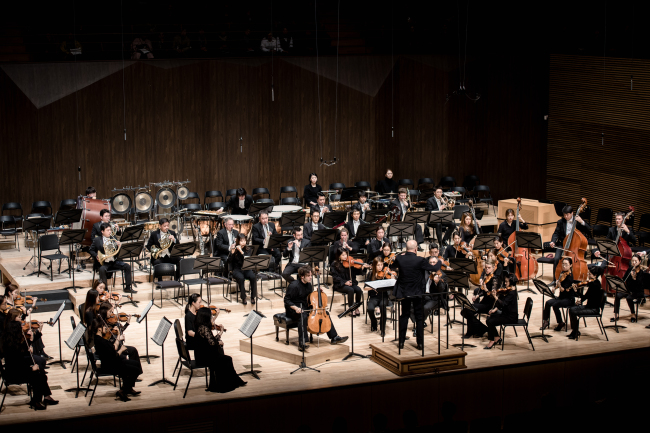Tongyeong celebrates native son’s music
Yun I-sang features predominantly at TIMF marking centennial of composer’s birth
By Yoon Min-sikPublished : April 2, 2017 - 17:07
TONGYEONG, South Gyeongsang Province -- The sound of a lone cello struggling against the orchestra opened this year’s Tongyeong International Music Festival in Tongyeong, South Gyeongsang Province, Friday.
German-French cellist Nicolas Altstaedt and the Tongyeong Festival Orchestra led by Stefan Soltesz performed Yun I-sang’s Cello Concerto written in 1976. The Korean-born composer was abducted from Germany by Korean agents in 1967 and handed a lifetime sentence on a charge of treason. He was imprisoned for two years before the Korean government freed him, bowing to international pressure. This experience would have profound influence on his later work.
Cello Concerto is autobiographical. The cello, an instrument which Yun played, tells the composer’s narrative. The cello is not in harmony with the orchestra; rather, it is in isolation from it, struggling against the orchestra. In this description of the piece, one can see Yun’s personal struggles as a Korean composer in Europe composing Western music. One can also see the struggles of an individual against the state.
German-French cellist Nicolas Altstaedt and the Tongyeong Festival Orchestra led by Stefan Soltesz performed Yun I-sang’s Cello Concerto written in 1976. The Korean-born composer was abducted from Germany by Korean agents in 1967 and handed a lifetime sentence on a charge of treason. He was imprisoned for two years before the Korean government freed him, bowing to international pressure. This experience would have profound influence on his later work.
Cello Concerto is autobiographical. The cello, an instrument which Yun played, tells the composer’s narrative. The cello is not in harmony with the orchestra; rather, it is in isolation from it, struggling against the orchestra. In this description of the piece, one can see Yun’s personal struggles as a Korean composer in Europe composing Western music. One can also see the struggles of an individual against the state.

Yun, Korea’s best known composer in the West, is credited with bridging the East and the West. And his efforts to bring Korean elements into Western classical music tradition is clearly seen in Cello Concerto. The cello strings are struck and picked, producing a sound akin to that produced by geomungo, the traditional Korean six-string zither. Sounds of moktak, a wooden percussion instrument associated with Buddhist monks, bring meditative moments to the largely dissonant single-movement concerto.
Beethoven Symphony No. 9 in D minor, Op. 125, more popularly known as the “Choral,” followed Yun’s Cello Concerto. While this massive choral piece is very well-known today and many music critics consider it one of the greatest works by Beethoven, its premiere in 1824 was not nearly as successful -- many critics thought the aging and deaf composer had completely lost it.
Set to the poem by Friedrich Schiller, “Ode to Joy,” the choral part of the symphony speaks of the prospects of a hopeful future achieved by brotherhood of mankind, mankind’s progress toward utopia.
Friday night’s programming, juxtaposing a contemporary piece that pits and individual against the world with a work that proclaims brotherhood of humanity, seems deliberate, providing a message of hope and reconciliation. At another level, the program showed how a once much criticized piece came to be universally appreciated; perhaps an expression of hope that Yun’s work will one day be appreciated for the music, freed from the controversies surrounding the composer.
Yun was not allowed to return to Korea in his lifetime after he went back to Germany and his music has seldom been perform in the country of his birth. As Yun’s work is mostly European avant-garde, those unfamiliar with contemporary classical music may find Yun’s work difficult to understand or appreciate at the first try. Although he features many Korean musical elements, including using Western musical instruments in such ways to make them sound Korean, they do not sound Korean to untrained ears.
“Loyang” (1962), performed on Saturday by the Isang Yun Soloists Berlin, for example features bak, a traditional Korean percussion instrument and incorporates many elements of Asian music. However, it is essentially a Western contemporary music and recalling traditional Korean music in that piece is a futile exercise.
The Isang Yun Soloists Berlin – originally composed of members who hail from the International Isang Yun Society and the Isang Yun Ensemble Berlin – also performed Yun’s Trio for Clarinet, Bassoon and Horn (1992) and “Piece concertante” (1976) on Saturday afternoon. Flutist Roswitha Staege and oboist Ingo Goritzki of the Isang Yun Soloists Berlin have been performing Yun’s music for decades.
This year, Koreans will have more opportunities to hear Yun’s work being performed, as the year marks the centennial of the composer’s birth. Tongyeong International Music Festival, which does not bear Yun’s name in its title although one of its goals is to commemorate the musical legacy of the composer, for example, will be featuring one or two works by Yun in each of the concert programs.
The festival comes to a close on April 9 with the Seoul Philharmonic led by Dennis Russell Davies performing “Short Ride in a Fast Machine,” from John Adams, Yun’s “Fanfare and Memorial” and Clarinet Concerto and Stravinsky’s “Le Sacre du Printemps.”
By Kim Hoo-ran
(khooran@heraldcorp.com)


![[AtoZ into Korean mind] Humor in Korea: Navigating the line between what's funny and not](http://res.heraldm.com/phpwas/restmb_idxmake.php?idx=644&simg=/content/image/2024/04/22/20240422050642_0.jpg&u=)
![[Exclusive] Korean military set to ban iPhones over 'security' concerns](http://res.heraldm.com/phpwas/restmb_idxmake.php?idx=644&simg=/content/image/2024/04/23/20240423050599_0.jpg&u=20240423183955)


![[Herald Interview] Why Toss invited hackers to penetrate its system](http://res.heraldm.com/phpwas/restmb_idxmake.php?idx=644&simg=/content/image/2024/04/22/20240422050569_0.jpg&u=20240422150649)
![[Graphic News] 77% of young Koreans still financially dependent](http://res.heraldm.com/phpwas/restmb_idxmake.php?idx=644&simg=/content/image/2024/04/22/20240422050762_0.gif&u=)







![[Exclusive] Korean military to ban iPhones over security issues](http://res.heraldm.com/phpwas/restmb_idxmake.php?idx=652&simg=/content/image/2024/04/23/20240423050599_0.jpg&u=20240423183955)



![[Today’s K-pop] Ateez confirms US tour details](http://res.heraldm.com/phpwas/restmb_idxmake.php?idx=642&simg=/content/image/2024/04/23/20240423050700_0.jpg&u=)